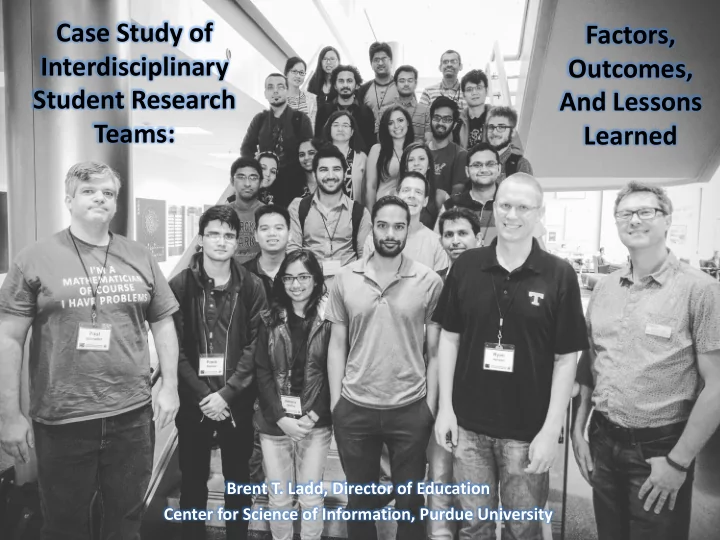

Case Study of Factors, Interdisciplinary Outcomes, Student Research And Lessons Teams: Learned Brent T. Ladd, Director of Education Center for Science of Information, Purdue University
National Science Foundation Science and Technology Center Center for Science of Information
Create a Community of Practice of young scholars around the emerging field of Science of Information
Pathways for Student Collaboration Informal Formal • CSoI Member in our • Faculty Projects Center Network • Co-Advisors • Conferences (poster • Student Training sessions) Workshops • Summer Schools • Student-led Research • Annual Center Project Teams Meetings
Guiding Questions • Is there a relationship between Center collaboration and scholarly outputs? • Do factors of funding, university, gender, or length of Center membership influence scholarly outputs or rate of collaboration? • What can be learned from student research team formation and interactions, and ability to address interdisciplinary questions? • To what extent can a community of young scholars with large geographic distribution productively collaborate?
Percentage of Graduate Student Members Collaborating on Research with Center members 52% 50% 49% 42% 36% 15% 11% 0% 1 2 3 4 5 6 7 8 NSF Annual Period
* 3 2.81 2.5 2.04 Mean Annual Publications 2 1.5 1 0.5 0 No Yes Collaboration on Research Publications? *n=256, F=11.89, p < 0.001
Factors measured that revealed NO influence on publications • Funding – whether or not they received their PhD stipends from our Center • Gender • University • Participation Level – number of Center events a student participated in (workshops, schools, seminars, etc.)
Collaboration as Dependent Factor • None of the independent factors measured revealed any significance in the model
Pathways for Student Collaboration Informal Formal • CSoI Member in our • Faculty Projects Center Network • Co-Advisors • Conferences (poster • Student Training sessions) Workshops • Summer Schools • Student-led Research • Annual Center Project Teams Meetings
Training Workshop: Data Science & Interdisciplinary Research Teams
Active Learning Based • teaching R, other data methods Focus on their research • data
Professional Development Support • NSF style proposal • Roles of each participant • How does it synergize with their graduate thesis goals • Blessing and guidance of their respective major professors • 6K per team for travel and meeting expenses per year
Year-Long Student-Led Teams Agronomy, Anthroplogy, • 7 annual workshops Behavior and Brain Science, • 14 Student Research Teams BioEngineering, Biology, Chemical Engineering, Civil • 21 Universities Engineering, Computational • 22 Departments Biology, Computer • 50/50 F/M ratio Engineering, Computer Science, Ecological Science and Engineering, Electrical and Computer Engineering, Electrical Engineering, Environmental Engineering, Forestry and Natural Resources, Geology, Languages, Mathematics, Medical, Physics, Sociology, Statistics
Student-Led Research Team Productivity • 14 Student-Led Research Project Teams • 44 Co-authored Conference Posters & Presentations • 15 Co-authored Journal Papers
Conclusions Significant positive relationship exists between Center • collaborations by graduate students and their scholarly publication productivity Given a range of informal and formal pathways that encourage • collaboration – graduate students in our community demonstrate capacity to successfully engage in interdisciplinary research Given even small amounts of travel and professional development • support, our graduate students have successfully formed a community of practice (despite being geographically dispersed) This collaborative approach developed during graduate study • appears to continue as they matriculate to post-doctoral and faculty positions
Questions? Brent Thomas Ladd, Director of Education Center for Science of Information Computer Science Department Purdue University West Lafayette, Indiana, U.S.A. laddb@purdue.edu https://soihub.org Made possible by grant NSF CCF-0939370
Recommend
More recommend